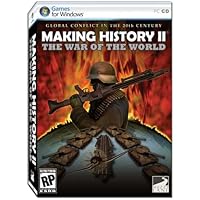
Average Reviews:

(More customer reviews)The 1930s and 1940s are a critical time in world history. The Great Depression and World War II dominate these years and our history. Fascism is on the march; communism is completing control of the USSR and testing the waters elsewhere. Democracy is reeling as the Depression causes massive problems that have no easy solutions. In the middle of all the politics, real advances occur in manufacturing techniques as technology builds the foundation of our modern world. Horses give way to automobiles; wood and fabric aircraft disappear, paved roads improved transportation and lifestyles changes.
Making History II puts you in control of a nation trying to survive this difficult and exciting time. As a national leader, you will allocate resources to nation building, international trade, research and defense. A careful balance will keep you popular, balance the budget and make others reconsider attacking you. Mess it up and you can lose you office or see your nation defeated in war. No two nations are the same. Technology is not uniform. Highly advanced nations have paved roads, universities and modern factories. Less advanced nations have dirt roads and small factories. The game allows you to play as any nation starting you with a government, technology level, cash on hand, alliances and relationships with the other nations. After that, it is up to you. Espionage allows you to steal research. Pay money to influence a nation to like you or make their government unpopular. Give them aid to help the government. Build up the military and go to war. Each action makes nations like you more or less. The less a nation likes you, the more likely they are to attack you. One of the failings of the game is the large democracies are more belligerent than the historical record. This can result in unexpected attacks; Great Britain attacking Brazil in 1938 surprised me. However, Brazil had several espionage operations exposed and was conducting an aggressive military buildup. Two small wars had resulted in the annexation of Uruguay and Paraguay. The Unites States had Brazil under a full trade embargo but came into the war on the side of Brazil. Play IS NOT forced into the historical norm, just about anything can and will happen.
Documentation is almost useless. Rushing the initial game into production resulted in major problems, corrected in the current version. However, the documentation problem remains. You cannot learn to play the game with the supplied instruction manual. Muzzy Lane maintains an active Making History site that can supply all the documentation, tutorials and answers to question needed. This site and a stable game with no obvious problems makes for an interesting and varied game play.
Making History II is NOT a click fest. This is NOT a fast-paced shoot `em up style gaming experience. This is a thought fest. You need to consider where you are and what direction you need and want to go in. Long-term goals need to be set and plans worked. Espionage can help, to a point, but national development has to occur. Each weekly turn, allows you to allocate production, conduct diplomacy, spy, set trade policy, monitor progress of existing projects, respond to offers of trade or alliances, declare war, make peace, fight battles, swear and any number of other things.
To learn the game, I played Brazil. This is a regional power with a small industrial base. After two games, I have master the mechanics and can move to a major power. The graphics are very good with nice animation. The AI is challenging and online game play is expected in early 2011. In addition, a large fan base has developed additional scenarios for the predecessor games and is starting to do the same for this one. I expect many, many hours of enjoyable gaming and recommend the game for anyone who is interested in this era.
Click Here to see more reviews about: Making History 2: War of the World
Making History II lets grand strategy players experience the role of a WWII era national leader embroiled in the toxic mix of waning empires, economic crisis, and ethnic "fault lines" that famously resulted in a global war that transformed the world. Now armchair generals and grand strategy masters can attempt to write their own history, and choose to either defend the world from tyranny or embark on a quest for global conquest. There are diplomatic decisions about everything from alliances to colonization, such as whether you grant full independence or create a puppet state. Cities are customizable via a series of constructible add-on buildings, allowing you to build a giant shipyard in New York or a munitions factory in Stuttgart. Military forces can be upgraded, repaired and reinforced and veteran units develop experience over time. Every nation in the world is playable, but the choices and strategy can be vastly different. The choice is up to each player to determine how they wish to develop their nation, thereby creating their own winning strategyInitiate infrastructure projects that modernize your nation and expand your economic potentialConstruct weapons factories, shipyards, research labs and a variety of other buildings that add specific abilities to your cities and regionsIntelligent AI instigates, reacts and adapts to the changing game dynamics generating action on the home front and abroadEach nation has a unique set of characteristics that influences behaviorPopulations are divided by culture, ethnicity, religion and political ideology; factors that destabilize nations, provoking revolts, coups and civil warsManage your colonies, liberate new nations, establish puppet states or annex their territoryEngage in espionage and interfere in the internal affairs of your neighborsNew innovative Multiplayer system
Click here for more information about Making History 2: War of the World

0 comments:
Post a Comment